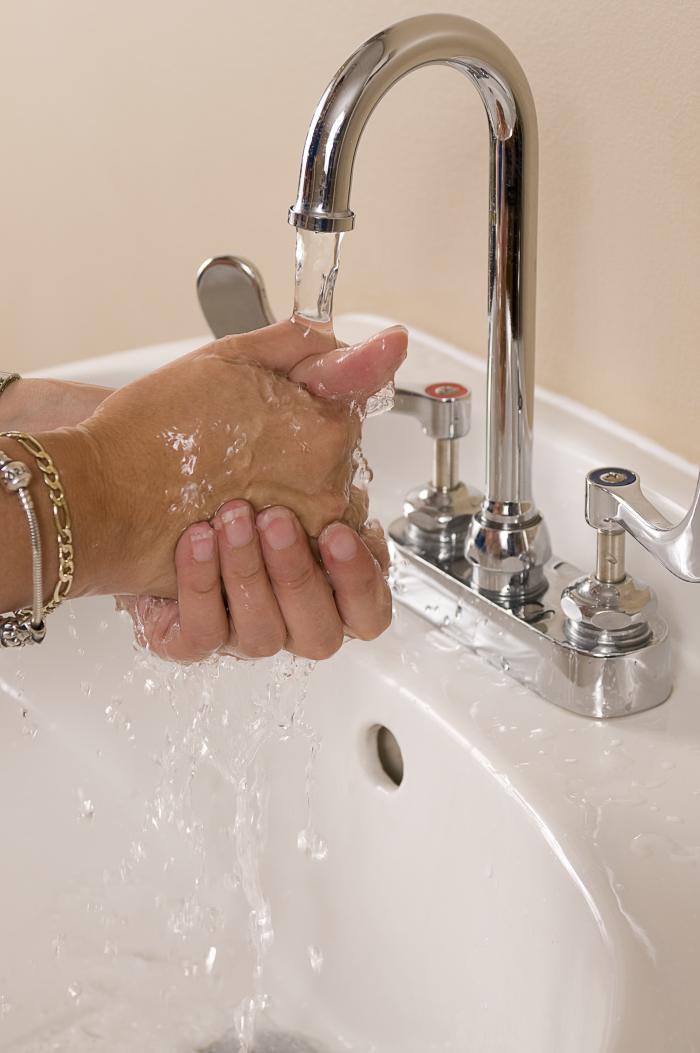

To Your Health: NLM update Transcript
Encouraging hand washing: 09/21/2015

Greetings from the National Library of Medicine and MedlinePlus.gov
Regards to all our listeners!
I'm Rob Logan, Ph.D., senior staff, U.S. National Library of Medicine (NLM).
Here is what's new this week in To Your Health, a consumer health oriented podcast from NLM, that helps you use MedlinePlus to follow up on weekly topics.
Diverse efforts to encourage hand washing appear to improve hand hygiene within medical centers, finds a comprehensive study, editorial, and viewpoint recently published in BMJ.
The study, a meta-analysis of 41 prior international studies, suggests improving hand hygiene in hospitals is linked to health care provider: education, feedback, reminders, goal settings, incentives, accountability, and an institutional emphasis on patient safety.
The study's nine authors suggest hospital-based interventions that address several rather than one or two factors are more likely to improve hand hygiene among health care providers.
For example, the authors noted the recommended hand washing guidelines from the World Health Organization (that urge periodic education, feedback, and reminders) boost provider hand washing compliance compared to usual practices. However, the findings from the meta-analysis suggest health care providers are more likely to wash their hands if the World Health Organization's recommendations are supplemented by hand hygiene goals, incentives, as well as accountability for institutional improvements.
In an interesting example of the drawbacks of using surrogate measures in research, BMJ's accompanying editorial suggests the hand washing outcome that needs to be assessed in future research is a reduction in patient infections rather than increased provider compliance within a medical center. By implication, the editorial suggests prior research may not directly assess the degree that increased hand washing reduces hospital infections.
An accompanying viewpoint in BMJ adds that despite provider acknowledgement of the importance of hand hygiene, hand washing compliance rates remain lackluster in international clinical settings. The author writes (and we quote): 'health workers clean their hands 40 percent as often as the World Health Organization considers essential to deliver safe care — and even less often in low and middle income countries' (end of quote).
The viewpoint's author notes hand washing in some nations is constrained by a lack of running water, soap, or an alcohol based rub within some clinical centers. However, the author counters hand washing problems persist even when providers have easy access to soap and water. The viewpoint's author writes (and we quote): 'pinning up hand hygiene posters has got us only so far, It's time to learn from other sectors and to try something new' (end of quote).
The viewpoint's author notes there may be a lesson in the increased hand hygiene as well as other provider precautions during the recent spread of the Ebola virus in the U.S. and other nations.
The author suggests future hand hygiene-provider interventions might (and we quote) 'evoke feelings of disgust around contaminated hands, appeal to the impulse to nurture those in our care, activate our human urge to conform to social norms, and achieve peer group affiliation' (end of quote).
Either way, the viewpoint acknowledges it is telling that persistent efforts are needed to persuade providers to wash their hands.
Meanwhile, basic information about hand washing for providers and patients of all ages is available (from the U.S. Centers for Disease Control and Prevention — the CDC) within the 'start here' section of MedlinePlus.gov's germs and hygiene health topic page.
A helpful overview of hand washing's do's and dont's (from the Mayo Foundation for Medical Education and Research) is available in the 'prevention/screening' section of MedlinePlus.gov's germs and hygiene health topic page. A CDC website that explains how clean hands save lives in emergency situations is available within the 'specific conditions' section of MedlinePlus.gov's germs and hygiene health topic page.
MedlinePlus.gov's germs and hygiene health topic page additionally provides links to the latest pertinent journal research articles, which are available in the 'journal articles' section. Links to relevant clinical trials that may be occurring in your area are available in the 'clinical trials' section. You can sign up to receive updates about germs and hygiene as they become available on MedlinePlus.gov.
To find MedlinePlus.gov's germs and hygiene health topic page please type 'hand washing' in the search box on MedlinePlus.gov's home page, then, click on 'germs and hygiene (National Library of Medicine).'
Before I go, this reminder... MedlinePlus.gov is authoritative. It's free. We do not accept advertising .... and it is written to help you.
To find MedlinePlus.gov, just type 'MedlinePlus.gov' in any web browser, such as Firefox, Safari, Chrome, or Explorer, on any platform.
We encourage you to use MedlinePlus and please recommend it to your friends. MedlinePlus is available in English and Spanish. Some medical information is available in 43 other languages.
Your comments about this or any of our podcasts are always welcome. We welcome suggestions about future topics too!
Please email the podcast staff anytime at: NLMDirector@nlm.nih.gov
A written transcript of recent podcasts is available by typing 'To your health' in the search box on MedlinePlus.gov's home page.
The National Library of Medicine is one of 27 institutes and centers within the National Institutes of Health. The National Institutes of Health is part of the U.S. Department of Health and Human Services.
A disclaimer — the information presented in this program should not replace the medical advice of your physician. You should not use this information to diagnose or treat any disease without first consulting with your physician or other health care provider.
It was nice to be with you. Please join us here next week and here's to your health!






















.png)











No hay comentarios:
Publicar un comentario